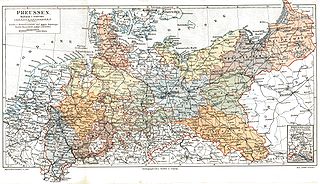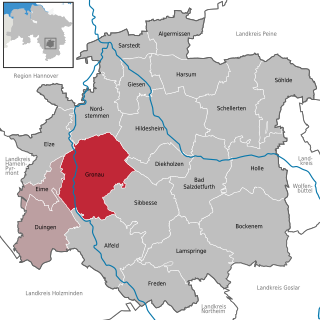
Lower Saxony is a German state in northwestern Germany. It is the second-largest state by land area, with 47,614 km2 (18,384 sq mi), and fourth-largest in population among the 16 Länder federated as the Federal Republic of Germany. In rural areas, Northern Low Saxon and Saterland Frisian are still spoken, albeit in declining numbers.

A Regierungsbezirk means "governmental district" and is a type of administrative division in Germany. Currently, four of sixteen Bundesländer are split into Regierungsbezirke. Beneath these are rural and urban districts

The Provinces of Prussia were the main administrative divisions of Prussia from 1815 to 1946. Prussia's province system was introduced in the Stein-Hardenberg Reforms in 1815, and were mostly organized from duchies and historical regions. Provinces were divided into several Regierungsbezirke, sub-divided into Kreise (districts), and then into Gemeinden (townships) at the lowest level. Provinces constituted the highest level of administration in the Kingdom of Prussia and Free State of Prussia until 1933, when Nazi Germany established de facto direct rule over provincial politics, and were formally abolished in 1946 following World War II. The Prussian provinces became the basis for many federal states of Germany, and the states of Brandenburg, Lower Saxony, and Schleswig-Holstein are direct successors of provinces.
Lutter or Lütter may refer to:

Municipalities are the lowest level of official territorial division in Germany. This can be the second, third, fourth or fifth level of territorial division, depending on the status of the municipality and the Land it is part of. The city-states Berlin and Hamburg are second-level divisions. A Gemeinde is one level lower in those states which also include Regierungsbezirke as an intermediate territorial division. The Gemeinde is one level higher if it is not part of a Gemeindeverband.

The German Emperor was the official title of the head of state and hereditary ruler of the German Empire. A specifically chosen term, it was introduced with the 1 January 1871 constitution and lasted until the abdication of Wilhelm II was announced on 9 November 1918. The Holy Roman Emperor is sometimes also called "German Emperor" when the historical context is clear, as derived from the Holy Roman Empire's official name of "Holy Roman Empire of the German Nation" from 1512.
Steinhorst may refer to the following places in Germany:

Große Kreisstadt is a term in the municipal law (Gemeindeordnung) of several German states. In some federal states the term is used as a special legal status for a district-affiliated town—as distinct from an independent city—with additional competences in comparison with other municipalities of the district. The title is based on sovereign conferment by the state government.
Bevern is the name of the following places in Germany:
Neuenkirchen can refer to several municipalities in Germany:
Hagen is a city in the Ruhr Area, North Rhine-Westphalia, Germany.

Gronau is a town and a municipality in the district of Hildesheim, in Lower Saxony, Germany. It is situated on the River Leine, approximately 15 km southwest of Hildesheim, and 35 km south of Hanover. Since 1 November 2016, the former municipalities Banteln, Betheln, Brüggen, Despetal and Rheden are part of the municipality Gronau.
Oldendorf can refer to several places in Germany:
Gronau is a former Samtgemeinde in the district of Hildesheim, in Lower Saxony, Germany. Its seat was in the town Gronau. On 1 November 2016 it was merged into the new Samtgemeinde Leinebergland.

Gemeindeverband is a union of at least two municipalities in Germany to form a Körperschaft des öffentlichen Rechts with the purpose to exercise the powers of self-government at a larger scale, while maintaining autonomy of its members.
Großes Moor may refer to:
Landwehr is the German word for a type of national home guard or territorial army. It may also refer to:

The list of German municipal flags lists the flags of municipalities of Germany. Most municipalities of Germany have unique flags.
This page is based on this
Wikipedia article Text is available under the
CC BY-SA 4.0 license; additional terms may apply.
Images, videos and audio are available under their respective licenses.





